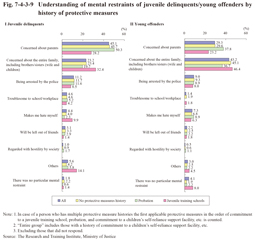6 Understanding of mental restraints
Fig. 7-4-3-9 shows the answers to the question of “what are the mental restraints from your doing “wrongful” acts that are prohibited by law” of juvenile delinquents/young offenders by history of protective measures. With juvenile delinquents the selection rates of “concerned about parents” (45.1%), “concerned about the entire family, including brothers/sisters (wife and children)” (23.2%), and “being arrested by the police” (11.2%) were high, and with young offenders the selection rates of “concerned about the entire family, including brothers/sisters (wife and children)” (43.2%), “concerned about parents” (29.3%), and “being arrested by the police” (9.0%) were high, thus indicating that around 70% considered their families to be mentally restraining/regulating. By history of protective measures, with those with a history of commitment to a juvenile training school the proportion of those that selected “concerned about parents” (28.2% with juvenile delinquents and 23.2% with young offenders) was lower than with others, and that of those who selected “concerned about the entire family, including brothers/sisters (wife and children)” was rather high. This indicates that those with a history of commitment to a juvenile training school considered that their entire family, including brothers/sisters, wife, and children, was stronger mental restraints than parents. In addition, although the number was small, examining those that selected “there was no particular mental restraint” revealed that no significant difference was observed between juvenile delinquents with and without a history of protective measures, whereas 8.0% of young offenders with a history of commitment to a juvenile training school answered that there was no mental restraint, thus leading to the assumption that they had weak family/social ties and thus felt isolated.
Fig. 7-4-3-9 Understanding of mental restraints of juvenile delinquents/young offenders by history of protective measures
